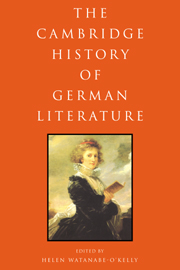Book contents
- Frontmatter
- 1 The Carolingian period and the early Middle Ages (750–1100)
- 2 The high and later Middle Ages (1100–1450)
- 3 The early modern period (1450–1720)
- 4 The German Enlightenment (1720–1790)
- 5 Aesthetic humanism (1790–1830)
- 6 Revolution, resignation, realism (1830–1890)
- 7 From Naturalism to National Socialism (1890–1945)
- 8 The literature of the German Democratic Republic (1945–1990)
- 9 German writing in the West (1945–1990)
- Select bibliography
- Index
- References
7 - From Naturalism to National Socialism (1890–1945)
Published online by Cambridge University Press: 28 March 2008
- Frontmatter
- 1 The Carolingian period and the early Middle Ages (750–1100)
- 2 The high and later Middle Ages (1100–1450)
- 3 The early modern period (1450–1720)
- 4 The German Enlightenment (1720–1790)
- 5 Aesthetic humanism (1790–1830)
- 6 Revolution, resignation, realism (1830–1890)
- 7 From Naturalism to National Socialism (1890–1945)
- 8 The literature of the German Democratic Republic (1945–1990)
- 9 German writing in the West (1945–1990)
- Select bibliography
- Index
- References
Summary
Introduction
The history of modern German literature cannot be detached from the social and political history leading from the authoritarian but relatively benign empires of Wilhelm II and Franz Joseph II to defeat in war, the establishment of fragile democratic republics, and the rise of a tyrannical, warlike and eventually genocidal Third Reich which left all of Central Europe in a state of devastation unmatched since the Thirty Years War. The exiled Thomas Mann told a New York audience in 1937: ‘It is in a political form that the question of man’s destiny presents itself today.’ Some authors, like Mann, arrived by complicated routes at a defence of democratic and liberal humanism; others placed their hopes in a conservative revolution or in the dictatorship of the proletariat. A literary history, however, must attend not only to authors’ explicit political choices but, still more, to the visions of society articulated in their imaginative works. And here we shall find a network of images, visions, beliefs and rhetorics which cut across political divisions, often in unexpected and disturbing ways, to give this rich and bewildering period a complex unity. As the late J. P. Stern showed in The dear purchase (1995), the highest achievements of modern German culture can be traced to the same imaginative matrix as many assumptions of the new barbarism. Hitler’s emergence was not inevitable, but the widespread acceptance of his rhetoric was not anomalous.
- Type
- Chapter
- Information
- The Cambridge History of German Literature , pp. 327 - 392Publisher: Cambridge University PressPrint publication year: 1997

